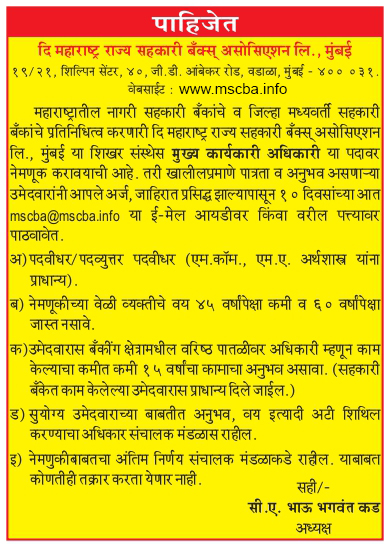ABOUT BANK
The Bank was originally registered as The Bombay Central Co-operative Bank Limited in 1911. However, it’s fore-runner The Bombay Urban Co-operative Credit Society was formed on 23-01-1906. With the passage of time, the Bank underwent a few constitutional changes before it acquired the present status, viz. The Maharashtra State Co-operative Bank Ltd. (Incorporating the Vidarbha Co-operative Bank Ltd.) on 1-5-1961 under the Registration No. 359 following the reorganization of states on the linguistic basis. It is interesting to note that as a result of constitutional changes, The Bombay Central Co-operative Bank Ltd. became known as The Bombay Provincial Co-operative Bank Ltd. in 1923, which from 1952 was recognized as The Bombay State Co-operative Bank Ltd.
Initially, the Bank laid emphasis on the establishment of live contacts with villagers, which gave impetus to the opening of branches in the state. The Bank’s credit and marketing activities were combined in its rural branches. However, in due course the Bank encouraged the formation of separate marketing societies and transferred the business to them. With the evolution of three-tier co-operative credit structure (PACS, DCCBs, MSCB), the Bank transferred its credit business to the newly established Central Financing Agencies, i.e. Districts Central Co-operative Banks. This paved the way for linking credit with marketing in the co-operative domain.
To widen the scope of co-operative activities, the bank has helped substantially in promoting not only new co-operative ventures, but also extended technical guidance and managerial expertise to them. Indeed, the Bank has a lion’s share in promoting the first co-operative sugar factory in the country at Pravara Nagar in Ahmednagar district. To promote its activities on a greater scale, the Bank constituted within itself a separate cell, viz. Co-operative Industries Commission, by drawing experts from various universities, technical institutes, industrial houses, and consultancy organizations. The bank thus gave fill up to the organization of co-operative and ancillary industries for the production of agricultural inputs such as fertilizers, agricultural machinery like oil engines, pump sets, tractors, etc. The bank also helped to set up secondary and tertiary industries manufacturing paper, alcohol, and lately ethanol based on the by-products of the agro processing industries. Today, the Bank is helping sugar factories in setting up the co-generation projects. These agro-based processing units are financially helped by MSCB & some of these units have promoted and/or helped the localities to start up the professional educational institutes viz. Medical Colleges, Engineering Colleges, etc. and spread the education which was a dream in semi-urban & rural vicinities.
But this is not surprising given the social commitment of the bank since its inception. Accordingly, the bank has constituted a Credit Stabilization Fund to ably meet natural calamities and at the same time created a Special Credit Stabilization Fund for strengthening Fishery, Agro Co-operatives. The funds are used to rehabilitate poor farmers through PACS and DCCBs.
Another feature of the working of MSCB is the introduction of the Crop Loan System. It was evolved by MSCB jointly with some District Central Co-operative Banks in the state. Following its success, the scheme evoked wide-spread interest, and similar experiments were launched in other districts of the state. Ultimately, the scheme was adopted by the Reserve Bank of India for its implementation throughout the country. The Bank thus proved to be a pioneer of the time-tested Crop Loan System.
The MSC Bank is the only Co-operative Bank with a Net worth of over ₹ 4,000 crore among all the Co-operative Banks in the Country. Bank has received "ISO 27001:2013" Standard for Information Security Management. Bank has received "Audit Class-A" for continuous last 11 years. Bank has maintained CRAR of 18.04% as against the required 9%, Net Interest Income ₹ 920 crore, Gross Profit ₹ 1,024 crore, and Net Profit of ₹ 609 crore as of 31st March, 2023.
